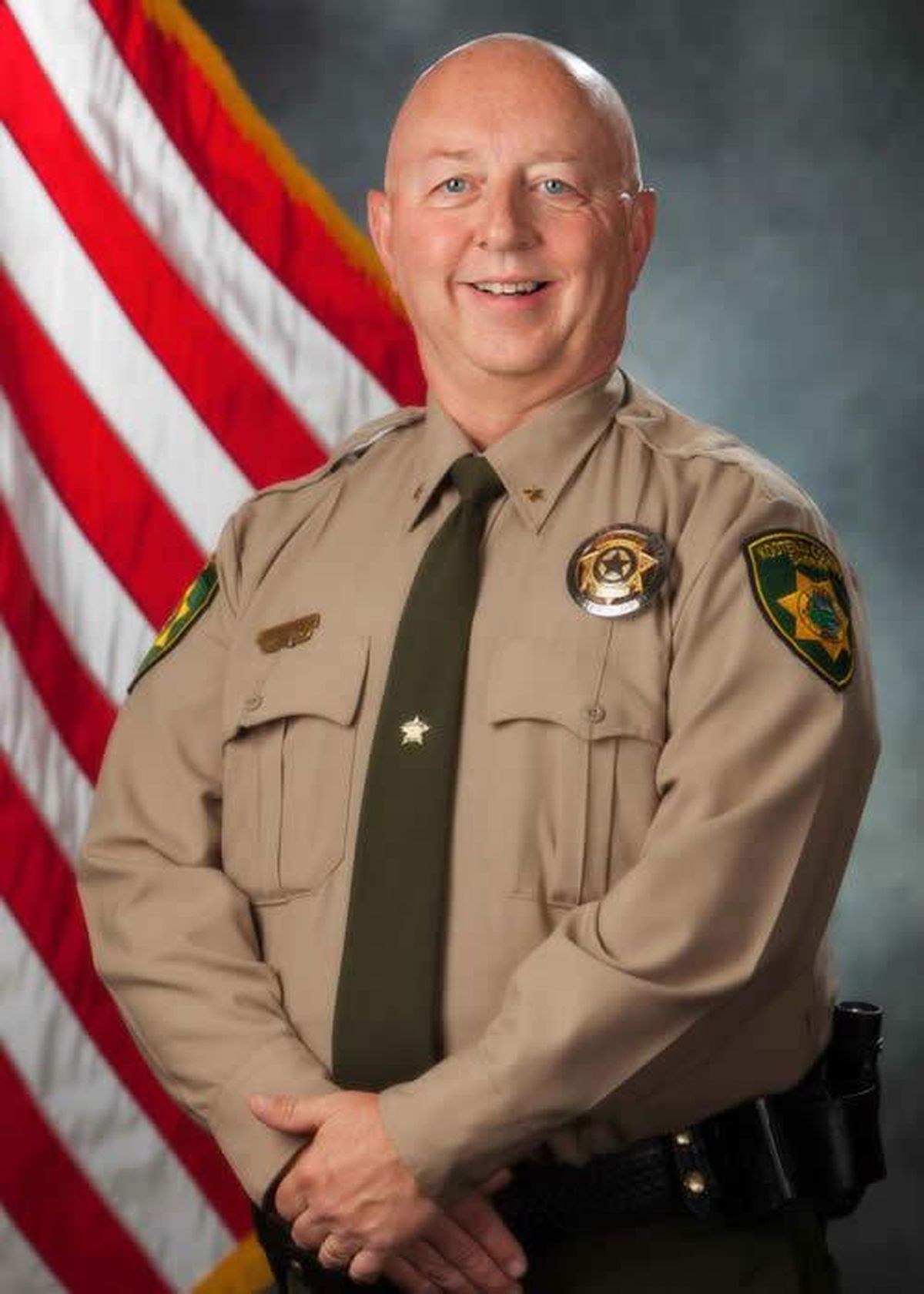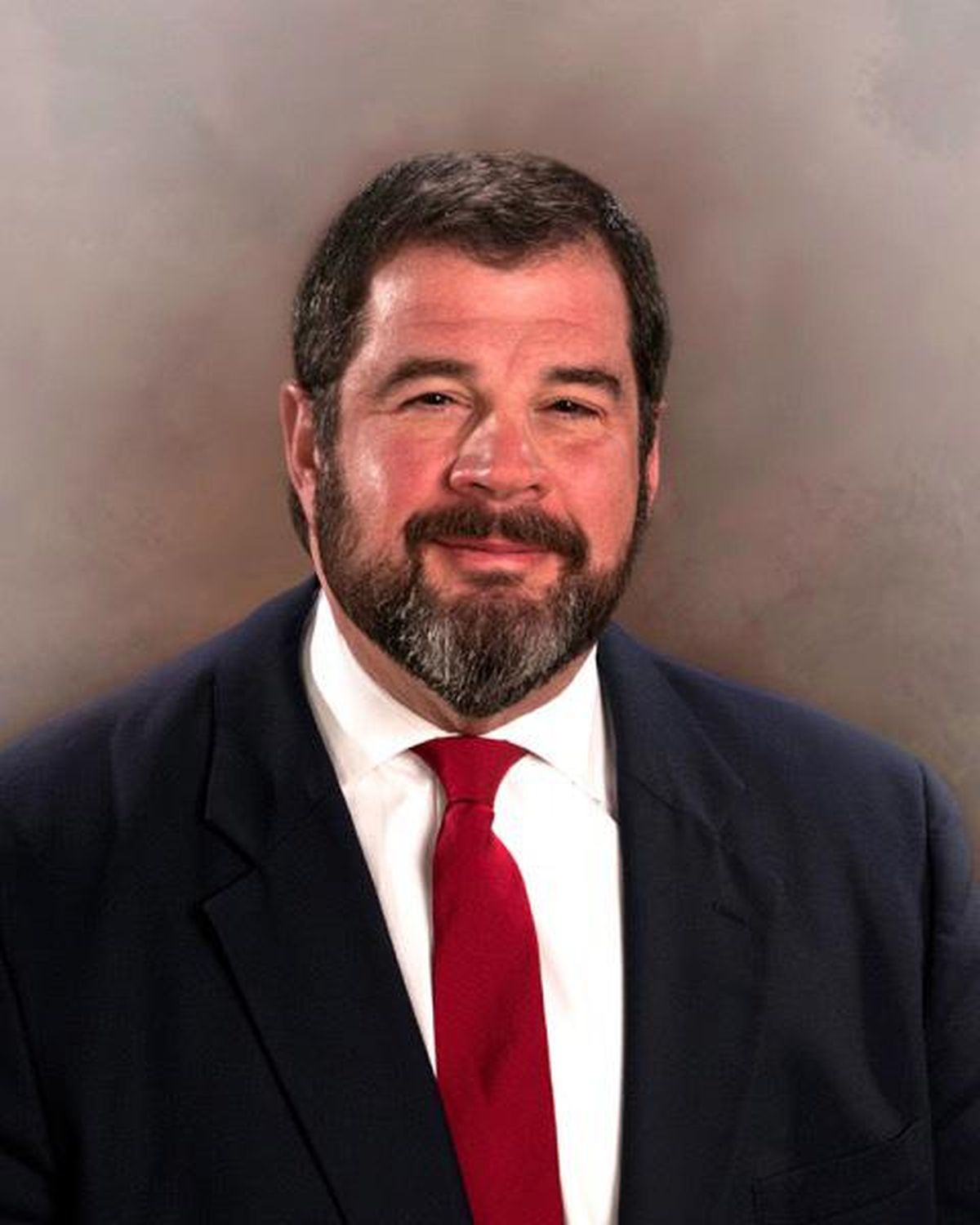Kootenai County candidates differ on proper role of sheriff
Kootenai County Sheriff Ben Wolfinger (Courtesy photo)
The race for sheriff of Kootenai County has gone well beyond a debate over patrol staffing, deputy pay and jail crowding.
In the May 17 Republican primary election, Rathdrum attorney John Green is challenging Sheriff Ben Wolfinger’s ideological view on the role of sheriff.
Green, who spent about 10 years as a Texas peace officer, is part of the Constitutional Sheriffs and Peace Officers Association, which claims the federal government overreaches on issues concerning taxes, land management and gun rights, and that sheriffs have the power to resist federal laws and arrest federal officials they believe are violating the Constitution.
Rancher Cliven Bundy’s armed showdown with the U.S. Bureau of Land Management in Nevada and this year’s armed occupation of the Malheur National Wildlife Refuge headquarters in Oregon are two instances when the local sheriffs should have intervened, he said.
“It’s no secret I have no respect for the federal government,” said Green, who is endorsed by Constitutional Sheriffs founder Richard Mack, a former sheriff in Arizona. “They’ve way out-stepped their bounds across the country.”
He and Wolfinger disagree on much, including a recent change in Idaho’s law on concealed weapons permits and how best to deploy the resources of the 305-employee Sheriff’s Office. They even have different takes on facial hair on the job.
Green also ran four years ago and finished third in the three-way primary. Wolfinger, a 33-year veteran of the department, easily won the 2012 general election and took the reins from retiring Sheriff Rocky Watson.
At a recent candidates forum, Green asked the audience, “Do we want to go back to 1940s Germany? In a lot of ways our country is headed that way.”
He later explained he was referring to the notion that the sheriff must enforce the law no matter what.
“My position is the Legislature specifically put the sheriff’s responsibilities in place so that he can make sure he even gets to police the law, and if it violates either the state or federal constitution, it’s his job to stand in the breach and say no,” Green said.
When Wolfinger hears Green talk about the need to “restore the constitutional principles of federalism to the office of sheriff,” he says it’s time for a civics lesson. It’s misleading to tell voters there’s a federal mandate for what a sheriff is, Wolfinger said.
“If you read the U.S. Constitution, I challenge anybody to show me where the word sheriff appears. It’s not there,” he said. “Sheriffs are established by state constitutions or state laws. … The authority to be the sheriff comes from the Idaho Constitution. But what the sheriff does is set by the Idaho Legislature. That’s just the bottom line.”
Wolfinger said he understands the frustration and distrust driving the backlash against federal law enforcement actions. The Western States Sheriffs’ Association – he serves on its board – is working to delineate authority and jurisdiction with agencies such as the U.S. Forest Service and BLM to prevent conflicts such as the Bundy confrontation, he said.
“We recognize the angst and the job of sheriff in the local law enforcement realm. We’re trying to make it happen in a proper way, not by revolt,” he said.
Green said he fully supports federal law enforcement agencies when they operate within the limits of their authority and jurisdiction. He also said, “The government’s not our boss, and we need to take that mind-set to the street with us when we’re working with the public.”
Wolfinger regularly speaks of doing his job with the heart of a servant, a refrain he encourages all his employees to embrace. He recalls the deputy who prayed with a cancer victim he had pulled over, and another who drove a night-blind elderly woman home and went back to the store to fetch her milk.
“That’s good public service,” he said.
Strong views,
morale boosters
Most of Green’s stint wearing a badge was with the Harris County Sheriff’s Department in Houston in the 1970s and ’80s. He’s a licensed lawyer in Washington and Texas, and he classifies himself as a traditional conservative Republican in favor of smaller government, lower taxes and individual responsibility.
In a recent interview, Green shared his views on some divisive legal and political issues.
January’s fatal shooting by Oregon state troopers of Robert “LaVoy” Finicum, a Bundy supporter who joined the Malheur refuge protest, was not justified, he said. Officers in encounters like that must consider a subject’s state of mind before they pull the trigger.
It’s inappropriate to comment on any investigation before it’s complete, Wolfinger said. “He wasn’t there; he doesn’t have firsthand knowledge,” he said.
Green said “Islam to me is not a religion, it’s a political ideology,” and that if Islam were to become “the prominent force” in the U.S., the nation would be subjected to atrocities such as those seen in other parts of the world.
He also said Kootenai County got a “bad rap” from the “white supremacist thing” – the presence of a violent Aryan Nations group in the 1980s and 1990s.
“I think that was way overblown,” he said. “People in Kootenai County are generally good people overall, and I think that’s why this is such a safe place to live.”
Wolfinger touts his experience and knowledge, and said he strives to be visible throughout the county and listen to the concerns of residents.
“It’s not unusual to see me in Bayview or Harrison or Worley,” he said. “I get out and talk to the community members, talk to city councils or business people.”
He was part of the team that brought the Northern Idaho Crisis Center to Coeur d’Alene for mental health services.
“We’ve needed it here for so long. We have one of the highest suicide rates in the state,” he said.
“They’re getting the help they need, getting connected to services, and not committing crimes and ending up in jail on some minor crime when they really shouldn’t be in jail.”
Department morale is up, the sheriff said, in part from little changes, such as allowing deputies to buy uniform ball caps and their own green jumpsuits.
“The guys tell me they’re super comfortable,” he said. “It didn’t cost us much or anything at all, and it made a big difference for the troops.”
He also has loosened the appearance code to allow civilian employees and nonuniformed officers to grow a beard or mustache.
Green said he isn’t sure he’d keep his beard if elected sheriff. “I’m going to let the citizens of Kootenai County decide whether I shave or not.”
Concealed carry controversy
When the Idaho Legislature took up a bill this year to get rid of the required permit for carrying a concealed gun inside city limits, Wolfinger called the legislation confusing and poorly written.
Lawmakers passed the bill and Gov. Butch Otter signed it, and it takes effect July 1. It specifies that people who aren’t legally qualified to carry a gun, for reasons including severe mental illness, drug use and felony convictions, can’t take advantage of the new law, but unlike the state’s current permit system, there are no background checks to determine that.
The change will make it harder for officers to screen anyone carrying a concealed gun to determine if that person legally may possess a gun, the sheriff said. It’s a matter of officer safety, he said.
“It’s North Idaho. Everybody’s got a gun. It’s just part of life,” said Wolfinger, adding that he has no concerns with responsible gun owners.
“I worry about the meth addicts with the guns, I worry about the people with mental illnesses with the guns, whether they stole them out of cars or people’s homes,” he said.
Society has become much more violent in the course of his career, Wolfinger said. He has known three North Idaho police officers shot and killed in that time, including Coeur d’Alene police Sgt. Greg Moore one year ago.
“If people are going to shoot at the cops, who else are they going to shoot at, who else are they going to rob or try to intimidate?” he asked.
The change in state law also eliminates a gun safety training requirement for concealed carry permits.
“What it’s done is taken away the ability for the sheriff to require some sort of firearms safety training,” which is needed for inexperienced, untrained or irresponsible gun owners, Wolfinger said.
Green said he agrees with the move to eliminate the concealed carry permit, saying it infringes on the right to bear arms.
“I don’t think that we should have to prescreen our law-abiding citizens before they can exercise a right,” he said. “… Arbitrary checks just to make sure someone’s qualified is contrary to the purpose of the Second Amendment.”
Green said he agrees with bans on firearms in courthouses, but he’s not sure it makes sense to prohibit guns anywhere else, including on school grounds.
“I don’t know who that helps,” he said. “This whole notion of no-gun zones helps criminals and mentally ill people that (say) there’s a ripe target.”

